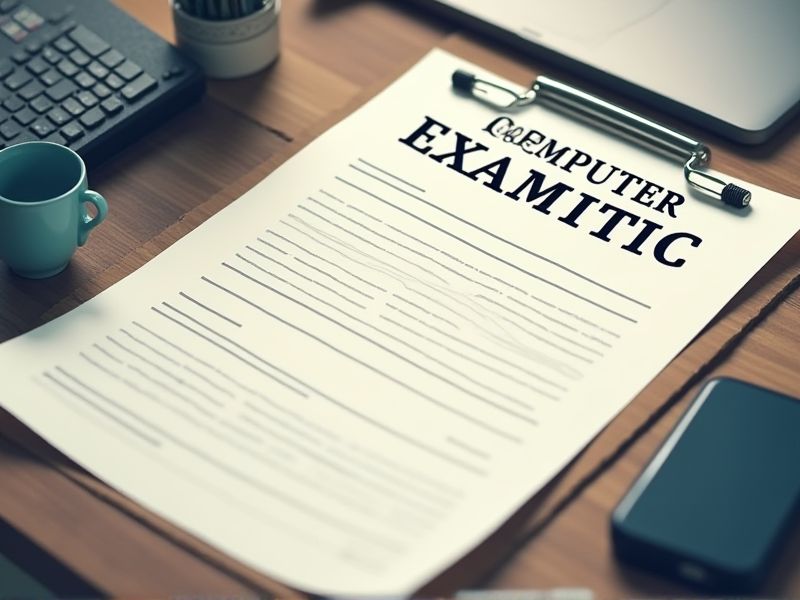
Computer Forensic Examiners require specific certifications to ensure they possess the technical skills and legal knowledge necessary for investigation. These certifications validate the examiner's ability to properly handle digital evidence while maintaining chain of custody. In legal contexts, recognized credentials can enhance credibility in court proceedings. Some important certifications to consider for a Computer Forensic Examiner include CCE, EnCE, and GCFA.
EnCase Certified Examiner (EnCE)
Organizations require an EnCase Certified Examiner (EnCE) to ensure the integrity and accuracy of digital evidence collection and analysis. Being EnCE certified demonstrates proficiency in operating the EnCase software, a widely used tool in forensic investigations. This certification also provides credibility in legal proceedings, helping to establish the reliability of forensic results presented in court. Many employers and agencies prioritize hiring certified professionals to maintain high standards and trustworthiness in forensic investigations.
Certified Computer Examiner (CCE)
The demand for a Certified Computer Examiner (CCE) arises from the need for standardized skills and knowledge in the domain of digital forensics. With the increasing complexity of cybercrime, having certified professionals ensures credibility and reliability in forensics investigations. Courts require testimony from experts with recognized certifications, making CCE crucial for legal proceedings. Organizations seek CCEs to maintain data integrity and forensic accuracy during investigations.
GIAC Certified Forensic Examiner (GCFE)
The GCFE certification is needed because it validates a computer forensic examiner's expertise in conducting precise digital investigations. Employers recognize this certification as a benchmark for quality, which leads to increased job opportunities. The comprehensive curriculum ensures that certified individuals possess current skills in analyzing and recovering digital data. A GCFE holder is better equipped to address complex forensic cases, enhancing the reliability of the evidence collected.
Certified Forensic Computer Examiner (CFCE)
The Certified Forensic Computer Examiner (CFCE) certification is needed for a Computer Forensic Examiner because it validates expertise in handling and analyzing digital evidence. This certification ensures adherence to legal and technical standards during investigations, enhancing credibility in court settings. It also provides comprehensive knowledge of investigative tools and methodologies, increasing effectiveness and efficiency in forensic examinations. CFCE credential supports career advancement by distinguishing professionals in a competitive job market.
Computer Hacking Forensic Investigator (CHFI)
Organizations experience increased cyber threats; this leads to a demand for Computer Hacking Forensic Investigators to analyze breaches. CHFI's expertise in uncovering digital footprints assists Computer Forensic Examiners in reconstructing cyber incidents. Legal proceedings often rely on accurate digital evidence, making CHFI services crucial for integrity verification. Advanced hacking techniques evolve constantly, which necessitates CHFI professionals to stay ahead in identifying and countering new methods.
GIAC Certified Forensic Analyst (GCFA)
The GCFA certification signifies a deep understanding of forensic analysis, essential for accurately reconstructing cyber incidents. Having this certification ensures that a computer forensic examiner can handle the complexities of modern digital evidence. With escalating cyber threats, organizations require certified professionals who can effectively investigate data breaches. The industry's demand for GCFA-certified examiners reflects the need for credibility and skill in legal and corporate inquiries.
AccessData Certified Examiner (ACE)
AccessData Certified Examiner (ACE) provides a standardized validation of expertise in using AccessData tools, crucial for ensuring accurate forensic investigations. Holding an ACE certification boosts a computer forensic examiner's credibility, making them more trustworthy in legal proceedings. The certification enhances an examiner's skill set in handling complex data analyses and digital evidence recovery. Organizations often prefer ACE-certified professionals because they assure competence in utilizing industry-leading forensic software.
Certified Cyber Forensics Professional (CCFP)
The CCFP certification provides a robust foundation in digital forensics by covering essential areas, such as legal and ethical principles, which a Computer Forensic Examiner must navigate. Possessing CCFP credentials signals to employers that the examiner can handle complex forensic processes involving multiple digital platforms. With cyber threats evolving rapidly, a CCFP ensures an examiner stays updated on the latest forensic methodologies and tools. Also, the certification instills a level of credibility and authority in legal contexts, evidencing the examiner's expertise in retrieving and analyzing digital evidence diligently.
Certified Information Systems Auditor (CISA)
Obtaining the Certified Information Systems Auditor (CISA) credential equips computer forensic examiners with validated expertise in auditing and analyzing complex information systems. This certification establishes a strong foundation in identifying vulnerabilities and ensuring security compliance, vital for forensic investigations. The CISA also enhances credibility and trust in the examiner's ability to handle sensitive digital evidence. Achieving the CISA demonstrates commitment to ongoing professional development, aligning with evolving industry standards and practices in cybersecurity and forensics.
Certified Ethical Hacker (CEH)
The CEH certification equips computer forensic examiners with essential skills to identify vulnerabilities in systems before exploitation, enhancing security protocols. Understanding hacker tactics aids examiners in tracing cybercriminal activities and reconstructing breach scenarios effectively. Knowledge of ethical hacking techniques helps forensic specialists develop robust defense strategies and interpret digital evidence with precision. CEH-certified individuals are better prepared to anticipate and mitigate potential threats, safeguarding the integrity of digital investigations.
Summary
When you obtain certifications as a Computer Forensic Examiner, your credibility in the field significantly increases. This leads to more professional opportunities, as employers and clients often prioritize certified experts. You will gain advanced skills and knowledge, enhancing your ability to effectively investigate digital evidence. Certifications also provide access to a network of professionals, which can be a valuable resource for career growth and technical support.
